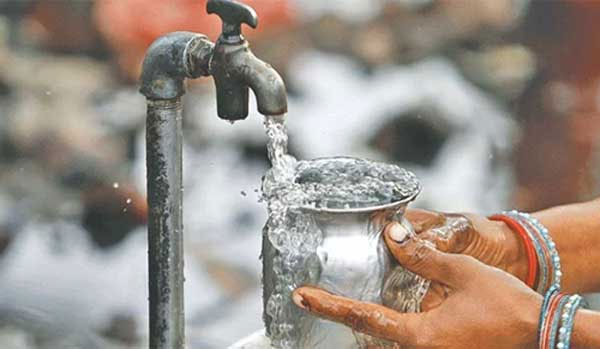Daijiworld Media Network – Mangaluru/Udupi (MS)
Mangaluru/Udupi, Feb 24: As the spectre of potential drinking water scarcity looms over the twin districts, Udupi and its administrative counterparts have initiated proactive measures to mitigate the impending challenge. While concerns persist, current assessments by district administrations indicate that the situation remains under control for the time being.
In Udupi district, officials have commenced the process of identifying areas in need of urgent water supply assistance through tanker services. As of now, no reports of significant drinking water shortages have been received, offering a glimmer of reassurance amidst growing apprehensions.

Efforts are underway to gather crucial data from various administrative units, including the city municipality of Udupi, town municipalities of Karkala, Kundapur, and Byndoor, as well as town panchayats of Saligrama and numerous gram panchayats across 155 villages.
With the Baje dam, a crucial source of drinking water for Udupi city, registering a mere 6.10-meter water level, authorities grapple with the harsh reality of rapidly depleting water resources across multiple rivers and groundwater reserves.
The situation paints a dire picture, with the water levels of Varahi, Sita, Swarna, Sauparnika, Papanashini, Kubja, Chakra, Edamavinahole, and Madisaalu dwindling at an alarming rate. Compounded by a staggering 25% shortfall in annual rainfall, the groundwater levels have also receded significantly, exacerbating concerns over the impending crisis.
Last year's distressing precedent looms large, as memories of water tanker supplies to parched villages remain fresh. In May 2023, 17 villages in Udupi, 14 in Byndoor, seven in Kaup, 14 in Karkala, 22 in Kundapur, 15 in Brahmavar, and 10 in Hebri relied on tanker deliveries for drinking water, providing a lifeline to 45,545 individuals from 9,939 families. The endeavour incurred an expenditure of Rs. 56.90 lakh, highlighting the scale of the challenge. As the current year witnesses an exacerbation of the crisis due to a heavy deficit in monsoon rains, authorities brace for intensified efforts to address the looming water shortage.
Contractors are reluctant to bid for government tenders for supplying drinking water due to several reasons. Privately supplying water allows them to conduct more trips, potentially earning them higher profits. In contrast, government tenders often require contractors to distribute water in residential areas, where they must wait for all residents to collect their water from the tanker. Additionally, government tender rates are typically lower than market rates, further discouraging contractors from participating.
Last year, some panchayats adopted innovative approaches to water distribution by utilizing vehicles that collect garbage. By placing water tanks on these vehicles, they were able to efficiently deliver drinking water to residents.
Deputy commissioner (DC) Dr Vidyakumari convened a meeting of the District Disaster Management Authority to address the pressing issue of the drinking water situation. During the meeting, she provided directives to Tahsildars and relevant department officials, emphasizing the importance of efficiently managing the impending water crisis.
The important instructions that were given in the meeting included fixing of wooden planks to vented dams of gram panchayats, private wells and borewells need to be identified to supply drinking water to commoners, continuous monitoring should be done by the taluk level committee, repairing of drinking water pipelines and overhead tank should be done, more volunteers in addition to 300 Apad Mitras should be made ready and awareness to install rain water harvesting to be created in every building and land.
Under the Jaljeevan mission, though the pipeline work is almost complete, supply of water has not yet begun. The aim is to provide water to 247190 families through JJM scheme. Already pipeline work is done for 199933 families. But the process of overhead tank construction, connection from the tank and water resources are still not identified. JJM scheme is expected to get completed towards the end of 2024.
DC Dr Vidyakumar of Udupi, said, “There is no drinking water issue at present in the district. Instructions are given to concerned officials to take all precautions to prevent any scarcity of drinking water.”
In Dakshina Kannada, two taluks are declared as affected by drought based on the last year’s rainfall. However, so far no drinking water shortage is experienced in any of the taluks, including the two. Mangaluru and Moodbidri taluks were declared as drought hit. However, post monsoon rains were good and so far there is no shortage of drinking water.
Instructions are given to officials to make list of possible water scarcity areas under the respective gram panchayat and town panchayat limits. Generally drinking water shortage is seen in Mangaluru, Bantwal and Sullia taluks during summer. Last year the Netravati river dried up completely which caused acute water scarcity. However, this year all preparations are made to face the situation. Even hay for cattle is kept ready.
Instructions are given to DC by the government to utilize the borewells and other wells in case of need. Use of tankers has to be done in case water scarcity is seen in hilly and remote areas. Data for the same needs to be gathered on tanker utilization app. Transparent tender process needs to be held for supplying emergency drinking water through hired water tankers.
Dakshina Kannada DC Mullai Mugilan said, “So far there is no drinking water scarcity in the district. Task forces are asked to hold meetings in every taluk and report the situation.”